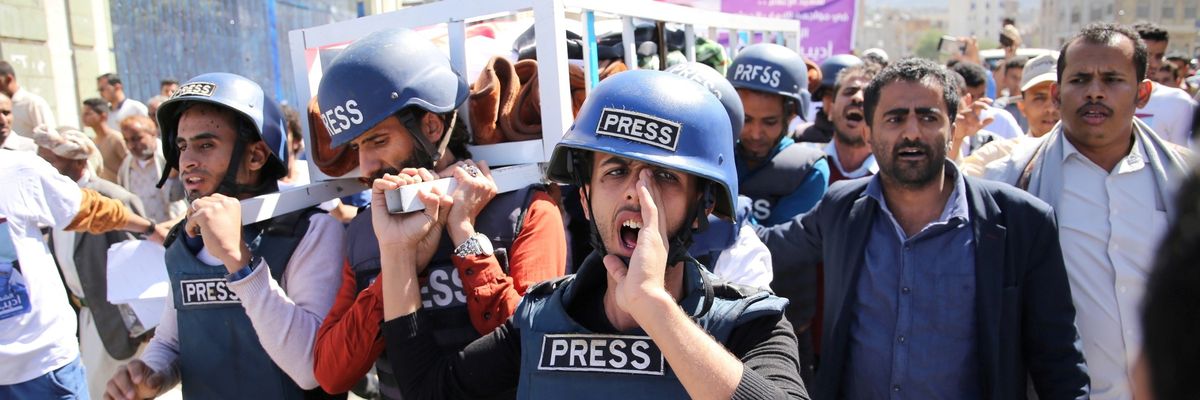Yemen’s new unity government got a rough welcome on the eve of the New Year, highlighting how the political stability and safety of this new arrangement lies on a knife’s edge as it begins to take control of southern Yemen.
The December 30 bombings at Aden International Airport left more than two dozen confirmed dead and over a hundred more injured — another bloody tragedy in the nearly six-year-old civil war. It only illustrates that there is so much work to be done by this nascent new government —not only ending violence and providing security, but restoring services and building trust among the population under its control.
A Nascent Unity Government
After the Riyadh Agreement was signed in November 2019, the Saudi kingdom exerted significant pressure to bring this unity government — a power sharing arrangement between the internationally recognized government of President Abd Rabbu Mansour Hadi and the United Arab Emirates-backed Southern Transitional Council, with equal members representing both the south and north regions of the country — into existence. As a result, the STC withdrew its declaration of “self-rule” three months after it first announced its independence in April 2020. Foreign powers and regional nations have hailed this new arrangement as an opportunity to end coalition infighting, to rebuild the country’s infrastructure, and to ultimately negotiate an end to the conflict with the Houthis.
Members of Hadi’s newly sworn-in cabinet were returning to Aden on Dec. 30, and were presumably the target of the airport attack, as well as a subsequent explosion at a presidential palace where the officials took refuge after the airport bombing. Fortunately none were severely injured or killed.
But there is more than violence that threatens this new government. They need to hold the various coalition partners together long enough to effectively engage the Houthis, which are in control in the north. What we can say is that this cabinet offers a new opportunity to build trust between the various factions sufficiently enough to ensure that none is tempted to resort to violence to gain leverage again. As more factions are given a voice and opportunities to share power within this government, less contentious initiatives like supporting suffering Yemenis and restoring basic services can also resume.
It is also important to examine where and how things can go wrong. The lack of trust between factions stems from long standing local rivalries that predate the most recent conflict, as well as influence exerted by external actors, notably the Saudis and the Emiratis. For example, the Al-Islah party has historical ties to the Saudi ruling class while STC has been actively supported through military training and arms distribution by the United Arab Emirates. The groups that make up STC and other prominent separatist groups have not forgotten how Al-Islah sided with the northern campaign in the brief civil war of 1994 and believe the group is angling to subjugate the south. The Islah party has long thrown its support behind Hadi’s party, the General Peoples’ Congress, and Hadi continues to need the support of the Islah party in order to maintain his legitimacy as president. Therefore, he cannot cut the Islah party out of important posts in his government in favor of STC.
As political arrangements in the agreement are set, the implementation of the military and security forces is vital for the new government’s survival and success. Battles between the former government and STC forces have led to much bloodshed and bad faith in the Aden, Abyan, and Shabwa regions. Each side tried to wrest military control of Aden as leverage in order to avoid dealing with the political demands of the other.
To the benefit of all sides, it became clear that using military force would not end the conflict. Under the agreement, soldiers will return to their former posts, and local security will resume their role in maintaining the peace. Furthermore, if the various military and security forces are integrated, with key posts divided between former adversaries, bonds of trust will begin to form as the safety and security of the civilian population become the main priority.
The Role of the United States
It is critical that the new Biden administration alter its stance towards the conflict and the United States support of Saudi Arabia. Ignoring the various factions that have a stake in the conflict, supporting Saudi attacks that have killed civilians, and blindly backing the Saudis assault on Houthi territory is not an option.
President Biden will have the opportunity to reduce arms sales to the Saudis and press them to maintain the balance of power in the new unity government and focus on diplomacy to end the conflict with the Houthis. The Saudis must understand they no longer have a blank check from Washington. As the UAE ended its official military presence in Yemen and abandoned its aim of a separatist southern Yemen in 2020, so must pressure build on Crown Prince Mohhammed bin Salman to compromise. The present situation offers Biden an opportunity to throw his weight behind UN-mediated diplomacy and a legitimate coalition government that is made up of various factions, not just the former Hadi government.
The Yemeni people, as well as millions of Yemeni Americans, want this conflict to end. The latter will be watching closely to see what steps Biden will take in relation to the Muslim ban and the Yemen war. The COVID pandemic has only increased the desire to end the conflict and focus on the lives and health of Yemeni civilians who are still experiencing food insecurity and, in too many cases, severe malnutrition and even starvation, not to mention a disastrous cholera outbreak. As this immigrant community continues to organize and participate in the political arena, they will hold Biden to his promises and mobilize accordingly.
















